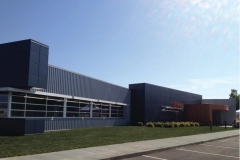Iron Mountain Raises its Game with Hyperscale Wins, ITRenew Acquisition
Iron Mountain Raises its Game with Hyperscale Wins, ITRenew Acquisition
MANASSAS, Va. – The Northern Virginia campus for Iron Mountain Data Centers presents a visual tableau of the growth of the Internet economy and evolution of digital infrastructure.
At one end of the campus is VA-1, a single-story facility with 10.5 megawatts of power capacity. That 2017 project is now dwarfed by its neighbor VA-2, a $225 million two-story data center built in 2020 with 36 megawatts of capacity. Next to these two structures is a huge mound of dirt, construction equipment, and land to support additional data centers.
In short: Big, bigger, and more to come.
This also reflects the progress of Iron Mountain, which has emerged as a larger force on the data center landscape, building beyond its base of enterprise document storage customers. The company has landed multiple large hyperscale deals, boosted by sustainability initiatives.
Iron Mountain leased 49 megawatts of data center capacity in 2021, including a 20-megawatt tenant at VA-2, which prompted an expansion of the building from 30 to 36 megawatts of capacity. Those leasing results exceeded the company’s projection of 30 megawatts (MWs), and Iron Mountain expects to do another 50 MWs of leasing in 2022.
“A few years ago, we were relatively a new entrant in the hyperscale business,” said William Meaney, President and CEO of Iron Mountain, on a recent earnings call. “We’re making really, really good progress. We’re starting to look more like a typical industry player in the data center space, where you’re getting 60% to 70% of the volume from hyperscale, and the rest from colocation and retail.”
With its history in corporate services, Iron Mountain offers customers a value proposition that goes beyond space and power. With its recent acquisition of ITRenew, Iron Mountain is raising its game in asset lifecycle management (ALM), burnishing its strong sustainability story and building deeper ties with the hyperscale providers that play a key role in IT Renew’s “circular economy” equipment recycling program.
A Legacy of Trust on Security, Compliance

Inside a data hall at the Iron Mountain VA-2 data center in Manassas, Virginia. (Photo: Rich Miller)
Iron Mountain’s data center operations are a growing segment of its business. The company was founded in 1951 to store papers and microfilm in a former underground mine, and has grown into the world’s leading provider of document storage, with more than 225,000 customers and a real estate network spanning 85 million square feet and 1,400 facilities.
In 2008 Iron Mountain began leasing data center space in its massive underground facility in Pennsylvania. The company has built a footprint of 3.5 million square feet of space across 19 data centers in 16 markets. About 91 percent of that capacity is leased, representing 176 megawatts of capacity.
The data center industry has long been the domain of specialized real estate companies. Iron Mountain is the perhaps most prominent example of a service provider from another sector building a beachhead in data centers, leveraging its trusted relationships with enterprise clients.
“What makes us unique is the history and breadth Iron Mountain brings to security and compliance,” said Troy Hill, Director of Data Center Operations at Iron Mountain. “We’re not just any other data center. Our customer base and our niche are highly regulated customers. We’ve done well with the federal government, the large providers who want to serve the federal government, and the integrators who work with them.”
In 2019 Iron Mountain began focusing on the cloud market, and in 2020 signed a 27-megawatt lease for a new data center in Frankfurt, serving notice that it had joined the top tier of developers that can provide capacity to large clients. That year the company also signed a 12 MW deal in Phoenix and the 20 MW customer in Northern Virginia.
“Our intent is to create campus settings where we can mix enterprise and government and cloud in the same location and be able to add multiple buildings,” said Mark Kidd, Executive Vice President and General Manager of Iron Mountain Data Centers. “Our mindset of focusing on scale and lower cost in building out a campus is continuing to pay off, as we see more demand starting to flow through into bookings and commencements.”
BREEAM Highlights Sustainable Construction
Iron Mountain has made the environment a priority, deploying solar power on data center rooftops, tracking the renewable content of its energy sourcing on an hourly basis, and offering more green power options to customers.
“We’ve pushed very aggressively on green power and tried to lead the way on this,” said Kidd. “We are pushing on the construction side now with the BREEAM standard.”
Last week the company said it had earned the BREEAM (Building Research Establishment’s Environmental Assessment Method) design certification of its Phoenix AZP-2 data center, becoming the first data center in North America to receive this certification for sustainable construction. BREEAM is a standard that was developed in the UK and was a predecessor to the LEED (Leadership in Energy & Environmental Design) green building rating system used in the US.
“BREEAM certification demonstrates a comprehensive approach to achieve results — from site selection and materials to energy use and the well-being of future occupants,” said Chris Pennington, Director of Energy & Sustainability for Iron Mountain.
“By intentionally designing and constructing data centers to optimize performance, we help to ensure a sustainable, interconnected future,” he added.
Supporting A ‘Cradle-to-Grave’ IT Lifecycle
Iron Mountain has further broadened its green focus with its acquisition of ITRenew, which decommissions data centers and recycles IT assets. ITRenew is a leading advocate of a “circular economy” – a closed loop system that provides a longer life for IT equipment, reducing waste and pollution without generating new carbon or pulling scarce resources from the ground.
Some of ITRenew’s largest customers are hardware operators that refresh their servers frequently, and retire equipment that can be reused. IT Renew removes the data from this equipment and repurposes it through its Sesame line of rack-scale solutions built on open architectures.
“I’m a huge proponent of this business,” said Kidd. “This is almost adding a whole new pillar to the Iron Mountain sustainability story. It’s a very natural adjacency to the data center business and a compelling offer, providing value to the hyperscale as well as the enterprise customer.”
Meaney believes ITRenew and the expanded ALM business align with several growing corporate priorities.
“If you think about our traditional customers, the way they dispose of their IT assets is becoming more and more important, both from a security standpoint as well as making sure that they disposed in a way that’s environmentally sensitive,” said Meaney, who said the deal is “bringing new capabilities to serve some of the largest and most innovative companies in the world in a more cradle-to-grave way, consistent with the best security and ESG practices.”
Interest in the pre-owned high-performance hardware like ITRenew’s Sesame offering has been boosted by the global semiconductor shortage, which has slowed the delivery of new systems.
“There’s a lot of interesting angles in creating more value for the whole chain,” said Kidd. “I think this is the next big step going forward.”
The Road Ahead
Iron Mountain ramped up its data center operations in 2017-18 through acquisitions, buying FORTRUST, IO and EvoSwitch, as well as sale/leasebacks of enterprise facilities in key business markets. Since then, it has favored purpose-built infrastructure in markets like Northern Virginia, Singapore and Phoenix.
Kidd says Iron Mountain is tracking the vigorous M&A activity in the data center sector, but said competition among investors has led to strong valuations for sellers.
“We see ourselves as prudent allocators of capital,” said Kidd. “Right now, given where assets are trading, there’s probably more value in development.”

The Iron Mountain AZP-2 data center in Phoenix, Arizona. (Photo: Iron Mountain)
Iron Mountain currently has 55 megawatts of data center capacity under development, including expansions to its campuses in Frankfurt, London, Amsterdam, Phoenix and Virginia.
The company controls land that can support up to 372 megawatts of additional development. That includes international expansion options in London, Amsterdam and India, as well as a campus in the Suburban Chicago market in Des Plaines, which can support a 36-megawatt data center.
An important focal point for future expansion is Northern Virginia – which brings us back to that huge mound of dirt in Manassas. Iron Mountain said it plans for a “significant expansion” of its Manassas campus, but hasn’t announced details.
But there’s plenty more to come. Financial statements filed with Iron Mountain’s fourth-quarter earnings show the company has boosted the potential capacity of future phases of its Northern Virginia operations to 222 megawatts, up from 103 MWs in the prior quarter.
That is consistent with the super-sizing of cloud campuses across Northern Virginia, the world’s most competitive market for cloud infrastructure. Hyperscale operators are seeking more runway for future growth, and many new projects provide 100 MWs of capacity or more.
“There was clearly an influx of demand with the hyperscale players last year,” said Kidd. “We are hearing people talking about larger requirements. The demand I’m seeing right now, I wouldn’t have thought was possible just two years ago.”
More >> Iron Mountain Raises its Game with Hyperscale Wins, ITRenew Acquisition


